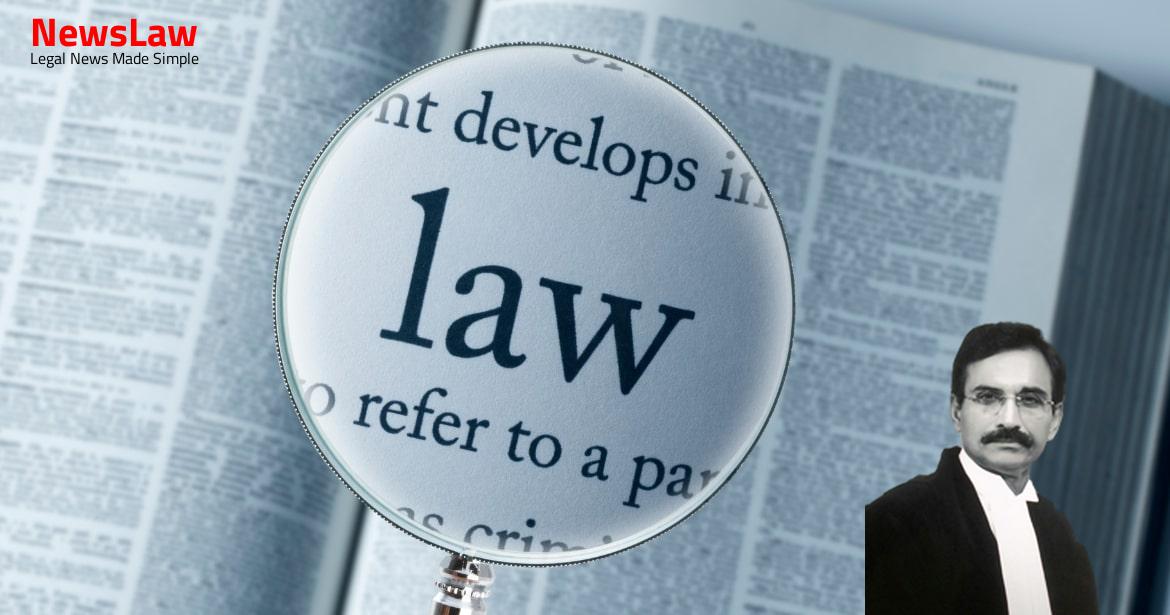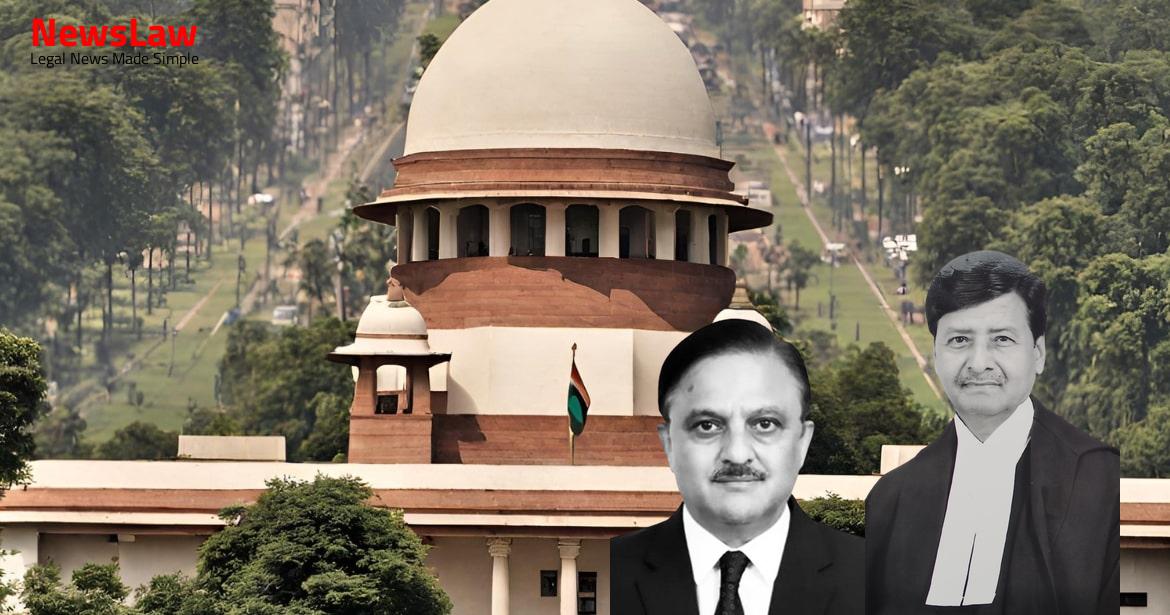In the case of challenging the selection process for Gram Rojgar Sahayak in Rewa District, the petitioners have raised concerns regarding the introduction of a computer efficiency test mid-way through the process. The respondents, including the office of Collector Rewa, Madhya Pradesh, issued a Revised Time Schedule for recruitment based on fresh guidelines. The petitioners, who were initially in the select list, were removed due to marks from the computer efficiency test, leading to legal disputes. Let’s delve into the details of this ongoing legal battle over the selection criteria for the position.
Facts
- The writ appeals were filed by the appellants assailing the order passed by the Learned Single Judge dated 02.04.2018 in W.P.No. 1494/2017 and W.P.No. 21425/2016.
- SLPs against the earlier order were dismissed, and the appeals were disposed of by a common judgment.
- Orders dated 06.08.2018 and 28.08.2018 were passed in the Writ Appeals related to the appellants and are being assailed.
- Special Leave Petitions filed by some appellants were also dismissed, leading them to appeal before the court.
- The issue pertains to the selection process for Gram Rojgar Sahayak in Rewa District, related to the implementation of the MGNREGS scheme in Madhya Pradesh.
- Previous writ petitions on the same issue were considered by a Learned Single Judge and later by a Division Bench, ultimately leading to dismissal of the appeals by the High Court.
- Contentions raised by the appellants before the Division Bench were similar to previous cases considered by the court, leading to the dismissal of the writ appeals.
- The office of Collector, Rewa, Madhya Pradesh issued a Revised Time Schedule for recruitment of Gram Rojgar Sahayak on 17.06.2014.
- The appointment was to be made as per the guidelines dated 02.06.2012 issued by the Madhya Pradesh State Employment Guarantee Parishad.
- The selection process included assigning maximum marks under various criteria as per Clause (8) of the guidelines.
- The introduction of a computer efficiency test mid-way in the selection process was deemed contrary to the settled legal position.
- The outer date for the computer efficiency test was indicated before 18 September in the Revised Time Schedule.
- The writ petitioners were meritorious and in the select list but were removed due to the marks of the computer efficiency test.
- The method alteration after the selection process had commenced was considered impermissible by the court.
Also Read: Liability for Employee Actions in Contractual Disputes
Arguments
- The writ petitioners appeared in the computer efficiency test despite being aware of the schedule and failing to qualify.
- The Collector of Rewa District introduced a criteria for computer course qualification not specified in the guidelines dated 02.06.2012.
- The guidelines only provided for assigning marks for desired qualifications from specified institutions, not for an efficiency test.
- The appellants argue that the order passed by the High Court should be considered per incuriam.
- It is asserted that the Revised Time Schedule was issued before the commencement of the process.
- The High Court allegedly ignored the fact that the selection process had already begun based on the guidelines and Revised Time Schedule.
- Computer efficiency was deemed necessary for implementing the MGNREG Scheme due to computerization of the processes.
- Gram Rojgar Sahayaks needed to have computer skills for the job, justifying the inclusion of a computer efficiency test in the selection process.
- The appellants argue that the High Court should not have accepted the writ petitioners’ challenge to the computer efficiency test.
- Learned senior Advocate for the appellants referred to certain observations in the order dated 17.10.2016 passed by the Division Bench in the review petition providing protection to meritorious candidates selected under the policy dated 02.06.2012.
- Revised time schedule did not specify the qualification in computer efficiency test to be a pre-condition for inclusion in the select list.
- Writ petitioners were already in the select list and exclusion from the merit list was not indicated.
- High Court addressed the contentions, took note of the aspects, and arrived at its conclusion.
- The orders passed in the relied upon cases relating to Amit Kumar Mishra and Others were considered.
- Writ petitioners were not estopped from challenging the action as the Revised Time Schedule indicated the computer efficiency test for selected candidates and those at the top of the merit list.
Also Read: Supreme Court Upholds Rejection of Plaint Under Order VII Rule 11 of CPC: A Critical Analysis
Analysis
- In the case of Ashok Kumar, the High Court decision regarding the introduction of additional criteria after nullifying the result of an earlier exam was justified.
- The Revised Time Schedule issued by the Collector, Rewa, was not a recruitment notification but a time schedule based on fresh guidelines from 02.06.2012.
- The selection process was to be based on the criteria and marks assigned in the fresh guidelines, with the computer efficiency test being a part of the assessment.
- Candidates participating in the computer efficiency test based on the time schedule cannot be estopped from challenging subsequent actions based on the test.
- The guidelines were applicable statewide, and altering requirements for only one district without proper authority was not sustainable.
- The application for the post was to be made following the guidelines from 02.06.2012, and any additional requirements introduced later in the selection process were not valid.
- Once a candidate has participated in a selection process knowing the laid down procedure, they cannot later claim unfairness if the outcome is unfavorable.
- The Supreme Court has established that candidates who willingly participate in a selection process cannot subsequently challenge its validity.
- Ignorance of a binding precedent renders a decision void as per the Supreme Court ruling in Subhash Chandra and Another vs. Delhi Subordinate Services Selection Board and Others.
- The principle of approbate and reprobate applies, meaning that a candidate cannot both accept and reject a decision based on its outcome.
- Candidates who do not raise objections to notification requirements and still participate in the process lose the right to challenge it later.
- Legal precedence, such as in the case of Ashok Kumar and Another vs State of Bihar and Others, supports the notion that appearing in an examination without objection waives the right to contest its results.
- Certain persons similar to the petitioners approached the court in SLP Nos.3239-3242/2017.
- The decision of the High Court cannot be considered as per incuriam due to the dismissal of the review petition in the above cases.
Also Read: Validity of Debt and Enforcement of Section 138 NI Act
Decision
- The court examined the special leave petitions.
- After considering all aspects of the matter, the court found no reason to interfere with the orders in question.
- The court made this decision during the course of the argument.
Case Title: NITESH KUMAR PANDEY Vs. THE STATE OF MADHYA PRADESH (2020 INSC 151)
Case Number: C.A. No.-001215-001215 / 2020



